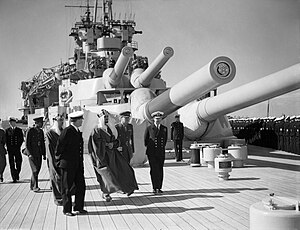Mansour bin Abdulaziz Al Saud
Mansour bin Abdulaziz | |||||
|---|---|---|---|---|---|
منصور بن عبد العزيز آل سعود | |||||
 Emir Mansur visiting HMS Queen Elizabeth at Alexandria in World War II | |||||
| Born | 1921 | ||||
| Died | 2 May 1951 (aged 29–30) Riyadh | ||||
| Cause of death | Alcohol poisoning | ||||
| Burial place | Al Adl cemetery, Mecca | ||||
| Spouse | Zahwa bint Abdulaziz bin Suleiman | ||||
| Parents |
| ||||
| Issue |
| ||||
| |||||
| House | House of Saud | ||||
| Religion | Islam | ||||
| Saudi Arabian Minister of Defense | |||||
| In office 10 November 1943 – 2 May 1951 | |||||
| Appointed by | King Abdulaziz | ||||
| Preceded by | (None) Office established | ||||
| Succeeded by | Mishaal bin Abdulaziz Al Saud | ||||
Mansour bin Abdulaziz Al Saud (1921 – 2 May 1951) (Arabic: منصور بن عبد العزيز آل سعود) was the first defense minister of Saudi Arabia and a member of Saudi royal family, House of Saud.
Early life
Prince Mansour was born in 1921.[1] He is widely believed to be the ninth son of King Abdulaziz,[2] but William A. Eddy argues that Prince Mansour is the sixth son of King Abdulaziz.[3]
His mother was an Armenian woman, Shahida (died 1938),[4] who was reportedly the favorite wife of King Abdulaziz.[5] Prince Mansour had two full brothers, Prince Mishaal and Prince Mutaib and a full sister, Princess Qumash, who died on 26 September 2011.[6]
Career
Prince Mansour was the emir of Murabba Palace in 1943.[7] He officially visited Cairo.[7] King Abdulaziz sent him there to support the Indian Muslim officers and men just before the Battle of El Alamein.[8]
Then he was appointed minister of defense by King Abdulaziz on 10 November 1943 when office was established.[9] Therefore, he is the first defense minister of Saudi Arabia.[10] Prince Muhammad and Prince Mansour accompanied King Abdulaziz in the latter's meeting with the US President Franklin D. Roosevelt on 14 February 1945.[3][11] He also participated in King Abdulaziz's meeting with British Prime Minister Winston Churchill in Egypt in February 1945.[12] Prince Mansour's term as defense minister lasted until his death in 1951, and he was replaced by his full brother Prince Mishaal who had been his deputy at the ministry.[9]
Personal life
Prince Mansour was married and had two children, Talal and Muhdi.[13] Prince Talal (born 1951) was raised by his uncle Prince Mutaib following the death of his father.[1] Prince Mutaib's daughter, Princess Nouf, married Prince Talal.[1] Prince Mansour's second wife was Princess Zahwa bint Abdulaziz bin Suleiman with whom he had a daughter, Nora, who died in infancy.[citation needed]
Death
Prince Mansour died of alcohol poisoning after a party hosted by then-Riyadh governor Nasser bin Abdulaziz[14] on 2 May 1951.[1] He was buried in Al Adl cemetery, Mecca.[15] Upon hearing of this event, King Abdulaziz threw Prince Nasser in jail. Nasser bin Abdulaziz subsequently lost his post and never returned to public life.[14]
Ancestry
| Family of Mansour bin Abdulaziz Al Saud | |||||||||||||||||||||||||||||||||||||||||||||||||||||||||||||||||||||||||||||||||||||||||||||||||||||||||||||||||||||||||||||||||||||||||||||||||||||||||||||||||||||||||||||||||||||||||||||||||||||||||||||||||||||||||||||||||||||||||||||||||||||||||||||||||||||||||||||||||||||||||||||||||||||||||||||||||||||||||||||||||||||||||||||||||||||||||||||||||||||||||||||||||||||||||||||||||||||||||||||||||||||||||||||||||||||||||||||||||||||||||||||||||||||||||||||||||||
|---|---|---|---|---|---|---|---|---|---|---|---|---|---|---|---|---|---|---|---|---|---|---|---|---|---|---|---|---|---|---|---|---|---|---|---|---|---|---|---|---|---|---|---|---|---|---|---|---|---|---|---|---|---|---|---|---|---|---|---|---|---|---|---|---|---|---|---|---|---|---|---|---|---|---|---|---|---|---|---|---|---|---|---|---|---|---|---|---|---|---|---|---|---|---|---|---|---|---|---|---|---|---|---|---|---|---|---|---|---|---|---|---|---|---|---|---|---|---|---|---|---|---|---|---|---|---|---|---|---|---|---|---|---|---|---|---|---|---|---|---|---|---|---|---|---|---|---|---|---|---|---|---|---|---|---|---|---|---|---|---|---|---|---|---|---|---|---|---|---|---|---|---|---|---|---|---|---|---|---|---|---|---|---|---|---|---|---|---|---|---|---|---|---|---|---|---|---|---|---|---|---|---|---|---|---|---|---|---|---|---|---|---|---|---|---|---|---|---|---|---|---|---|---|---|---|---|---|---|---|---|---|---|---|---|---|---|---|---|---|---|---|---|---|---|---|---|---|---|---|---|---|---|---|---|---|---|---|---|---|---|---|---|---|---|---|---|---|---|---|---|---|---|---|---|---|---|---|---|---|---|---|---|---|---|---|---|---|---|---|---|---|---|---|---|---|---|---|---|---|---|---|---|---|---|---|---|---|---|---|---|---|---|---|---|---|---|---|---|---|---|---|---|---|---|---|---|---|---|---|---|---|---|---|---|---|---|---|---|---|---|---|---|---|---|---|---|---|---|---|---|---|---|---|---|---|---|---|---|---|---|---|---|---|---|---|---|---|---|---|---|---|---|---|---|---|---|---|---|---|---|---|---|---|---|---|---|---|---|---|---|---|---|---|---|---|---|---|---|---|---|---|---|---|---|---|---|---|---|---|---|---|---|---|---|---|---|---|---|---|---|---|---|---|---|---|---|---|---|---|---|---|---|---|---|---|---|---|---|---|---|---|---|---|---|---|---|---|---|---|---|---|---|---|---|---|---|---|---|---|---|---|---|---|---|---|---|---|
| |||||||||||||||||||||||||||||||||||||||||||||||||||||||||||||||||||||||||||||||||||||||||||||||||||||||||||||||||||||||||||||||||||||||||||||||||||||||||||||||||||||||||||||||||||||||||||||||||||||||||||||||||||||||||||||||||||||||||||||||||||||||||||||||||||||||||||||||||||||||||||||||||||||||||||||||||||||||||||||||||||||||||||||||||||||||||||||||||||||||||||||||||||||||||||||||||||||||||||||||||||||||||||||||||||||||||||||||||||||||||||||||||||||||||||||||||||
References
- ^ a b c d Sabri Sharif (2001). The House of Saud in Commerce: A Study of Royal Entrepreneurship in Saudi Arabia,. New Delhi: I. S. Publication. ISBN 81-901254-0-0.
- ^ Nabil Mouline (April–June 2012). "Power and generational transition in Saudi Arabia" (PDF). Critique Internationale. 46: 1–22. Retrieved 24 April 2012.
- ^ a b William A. Eddy (2005). FDR meets Ibn Saud (PDF). Vista: Selwa Press.
- ^ "Biography of Shahida". Datarabia. Retrieved 10 August 2012.
- ^ Joseph A. Kechichian (2001). Succession in Saudi Arabia. New York City: Palgrave.
- ^ "Custodian of the Two Holy Mosques performs funeral prayer on the soul of Princess Gumash bint Abdulaziz". Riyadh Municipality. 27 September 2011. Retrieved 12 August 2012.
- ^ a b "The King of Arabia". Life. 31 May 1943. p. 72. ISSN 0024-3019. Retrieved 10 February 2013.
- ^ George Kheirallah (1952). Arabia Reborn. Albuquerque: University of New Mexico Press. p. 254. Retrieved 14 March 2015. – via Questia (subscription required)
- ^ a b "Royal Saudi Land Forces History". Global Security. Retrieved 21 July 2013.
- ^ "قصة-السعودية-مع-الوزراء-الثلاثينيين". Al Arabiya. 4 February 2015. Retrieved 28 March 2015.
- ^ Thomas W. Lippman (April–May 2005). "The Day FDR Met Saudi Arabia's Ibn Saud" (PDF). The Link. 38 (2): 1–12. Retrieved 5 August 2012.
- ^ "Riyadh. The capital of monotheism" (PDF). Business and Finance Group. Retrieved 22 July 2013.
- ^ "Family Tree of Mansur bin Abdulaziz bin Abdul Rahman Al Saud". Datarabia. Retrieved 10 August 2012.
- ^ a b "The new successıon law preserves the monarchy". Wikileaks. 22 November 2006. Retrieved 21 April 2012.
- ^ "Al-Adl: One of Makkah's oldest cemeteries". Saudi Gazette. 18 June 2012. Retrieved 15 August 2012.


